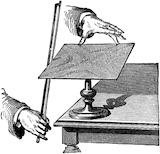The Physicists -
“The proper method for inquiring after the properties of things is to deduce them from experiments” ~ Sir Isaac Newton
Isaac Newton
Sir Isaac Newton, was considered by the likes of Jefferson to be the central figure of the Enlightenment. As Newton, the Natural Philosopher shares his deep insights into the Laws of Physics and how the motions of the planets and the fall of an apple combine to explain phenomena throughout the Universe. The famous but temperamental genius established the science of Opticks, invented telescopes, devised Calculus, and wrote the laws that allowed man to explore outer space.
Joseph Priestley
Joseph Priestley was not only a progressive political thinker but a pioneer in both Chemistry (He discovered oxygen.) and “Pneumaticks”, the study of air and pressure. His demonstrations with vacuum pumps and fountains show influence of invisible forces of the atmosphere on weather, physiology, and even human flight!
Albert Einstein
The Natural Philosopher continues the trajectory of physics into the 20th century with a characterization of famed physicist, Albert Einstein. The professor insightfully speaks on his Theory of Relativity, space and time, the nature of light, black holes, atomic energy, and other topics in modern physics.
Count Rumford
The Natural Philosopher also portrays other pioneers in physics and engineering including the surprising Benjamin Thompson, also known as Count Rumford. The Count was an American-born loyalist, soldier, spy, and scientific advisor to European royalty. His discoveries in Thermodynamics (the study of heat) improved everyday life for troops, the poor, cooks, and kings.
Humphry Davy
Davy was Britain’s most famous public lecturer on topics in chemistry and physics and served as mentor to electrical pioneer, Michael Faraday (also interpreted by Mr Howarth).





